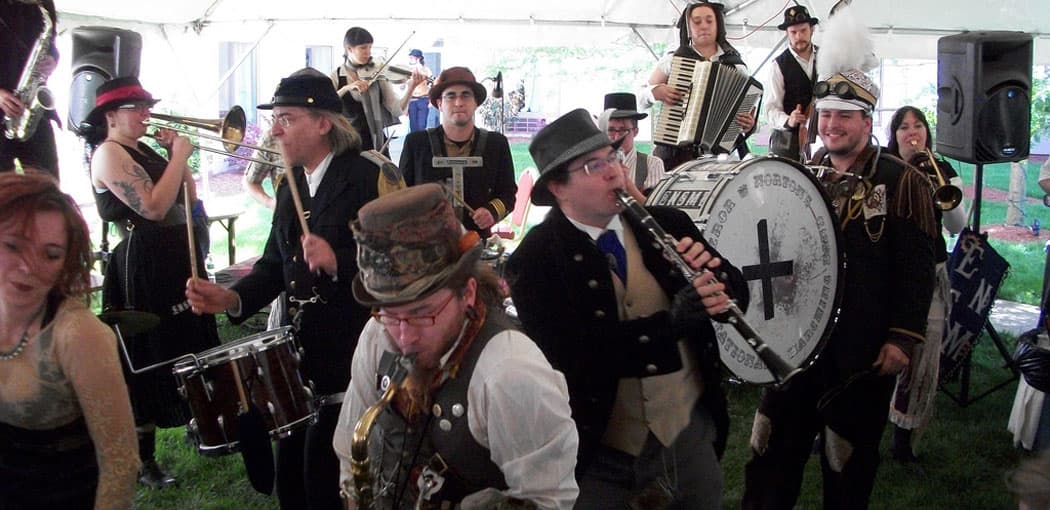Advertisement
What Happens When Electronic Dance DJs Remix A Steampunk Marching Band?

The 17 members of Emperor Norton’s Stationary Marching Band describe themselves as a gypsy-klezmer-circus-funk ensemble. But the Somerville gang’s omnivorous musical appetites also extend to Balkan tunes, free jazz, funk, New Orleans-style jazz, metal, steampunk, school marching bands and covers of Michael Jackson’s “Thriller” and Rage Against the Machine’s “Killing in the Name.”
“It’s a hearty stew of a little bit of everything,” bandleader Chuck Lechien says. “We mix and match pretty liberally.”
That magpie attitude is behind their new album “#SPACEFUTURE: remix volume 1,” which they’re launching with a release party performance at Cuisine en Locale, 156 Highland Ave., Somerville, on Saturday, May 10. (The event and a PledgeMusic crowdfunding campaign are also aimed at funding the ensemble’s upcoming West Coast tour to San Francisco and “HONK! Fest West” in Seattle.)
Emperor Norton is known for its acoustic, breath-powered wall of brass and drum sound. But on the new release they’ve invited five DJs to chop up, remix and mutate 10 tracks from their previous album, “Disco Dischordia,” as jazzstep, glitch or dark ambient electronic dance numbers.
Denver DJ Ian Campbell transforms the fast, thumping, Balkan tune “Crzi Voz” into a mass of higher pitched horns weaving through a stuttering, staccato electronic beat. “I never would have thought of turning this song into a drum and bass groove,” Lechien says. (Campbell and Somerville's DJ FiG will be spinning tunes along with a live performance by the Emperor Norton folks at the release party.)
The big band klezmer of “Telem Took It” in the hands of MDSV becomes the foundation for “an extended hip-hop jam featuring two rappers,” Lechien says. (Sample the before and after here.) When that same German DJ remixed “Pachycephalophilaphobia,” he “pulled out one of the tiny noises and samples and completely rearranged the song to basically be a totally new composition. But the old song is still in there,” Lechien says. “It psychologically and artistically stays in what we’re doing even though it’s far less organic than people are used to hearing our music.”
In other words, he says, “It adds this whole other layer to this multi-genre style.”
Emperor Norton debuted in 2007. “Lots of horn and lots of percussion. I love the sound,” Lechien says. “I love a big fat horn sound that you can get by having all those horns playing together and then also breaking it down into individual voices.”
Their arrival coincided with an international revival of live thumping, grooving big band brass and percussion in styles ranging from Eastern European to Caribbean to New Orleans. The annual “Honk” marching band festival, which began in Somerville and Cambridge in 2006, was the first big showcase to recognize the trend and bring it together. The festival’s organizing idea was so prescient and infectious that it’s been copycatted in New York, Seattle, Austin, Providence and Australia.
“The marching thing is so much fun. It is so invigorating. … It is just so powerful to be in the audience. To not have this distinction between you the performer and the audience. It’s just one big group thing,” Lechien says. “It’s a great recipe for mayhem in the most artful of ways.”
These big marching bands were heavily populated by folks who’d been high school band geeks—and were one more example of the rise of geek culture. The bands’ acoustic methods also plugged neatly into the homespun, crafty DIY revival of the past decade or so, from Stitch ‘n Bitch knitting meetups to the online craft fair Etsy. For each sleek Apple product of the future that we stuff in our pockets, we seem to crave to balance it out with something plainly, idiosyncratically human and handmade.
Emperor Norton’s “#Spacefuture” remixes stand right on this axis. They “take what is this really organic street level vibe that we have going on and process it through lots of technology and chop it up. There are too many interesting things you can do musically to limit yourself,” Lechien says. “We just never want to shut ourselves off from all these possibilities. Handing ourselves over to remixers is just an extension of that.”
Greg Cook is co-founder of WBUR’s ARTery. Follow him on Twitter @AestheticResear. Friend him on Facebook.
This article was originally published on May 09, 2014.

